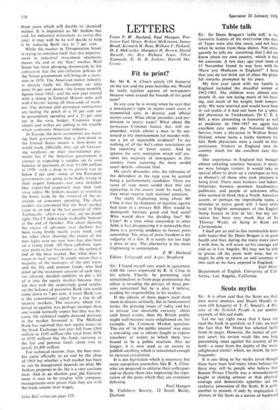Scots myths
Sir: It is often said that the Scots are their own worst enemies, and Stuart Hood's re- view (10 January) of T. C. Smout's A His- tory of the Scottish People is yet another example of this sad truth.
Let me say right away that I have not read the book in question, so I take on trust the fact that Mr Hood has selected fairly from its pages. However, the matter of con- text apart. his review reads like one long patronising sneer against the country of his birth—a sneer from the depths of the 'more enlightened circles' which, no doubt, he now frequents.
It is one thing to lay myths (even though these have been laid many times before) for there may still be people who believe that Bonnie Prince Charlie was a misunderstood knight in shining armour or that physical courage and democratic appetites are the exclusive possession of the Scots. It is quite another to present, if only by implication. 3 picture of the Scots as a nation of backward
rogues, scoundrels and hypocrites only re- cently liberated from a cultural darkness.
Nor is Mr Hood always entirely correct in his examples. The deeds performed by the Highland regiments in defence of the British Empire and in two world wars are not en- tirely 'mythical'. Nor is it true that the '45 was a mere sideshow on the canvas of Scottish history; anything could have hap- pened if the Scots clans with the support of the Irish contingents had won the battle of Culloden.
Or take again, if one wishes, Mr Hood's strictures on the 'myth' of Scottish educa- tion. It may be narrow (in the sense that it does not include ballet, theatricals and self- expression classes) but surely he will not deny that it went very deep. In my own day at least, we were taught to write, read, spell and count as well as something of the planet on which we live—elementary stuff, perhaps, but better than what passes for literacy and numeracy today. Further, will Mr Hood dispute the fact that this poor, be- nighted country, which for most of its his- tory has apparently been populated largely by serfs and slaves, has somehow turned in an achievement in science, engineering, medicine and philosophy which, in the cir- cumstances, can only be described as remarkable?
The point is that every country selects myths from its history, possibly because it has a psychological need for a past full of glory and achievement. For every Scottish myth I could quite easily provide an Eng- lish myth, but I do not wish to labour the point. Names like Drake, Nelson, Wellington and Churchill will be remembered long after the horrors of the Industrial Revolution and the subjection of Ireland have been for- gotten. And in any case most peoples are much ' better than their history would suggest.
Again, your reviewer sounds somewhat affronted by the lad o' pairts nurtured in the narrow tradition of Calvinism'. If we must deal in archetypes, let it be said that the lad o' pairts was, and is, a terrible bore probably, but he is infinitely preferable to the student revolutionary battening on a society for which he has nothing but con- tempt. As one who had to thole the joyless Calvinism of the Auld Kirk, I could at least admire its teaching on self-reliance and on personal responsibility for one's actions. It did not teach us to blame society when things went badly for one.
Believe it or not, I am no supporter of the 'here's tae us, wha's like us!' fraternity. On the contrary, I admit that the Scots are often intolerant, dogmatic and aggressive. On the other hand, we are a much better and more civilised people that one would infer from Stuart Hood's review.
Robert McKinnon 38 Gainsborough Road, New Malden, Surrey Sir: I hesitate to challenge a Scot on his own ground but surely Mr Stuart Hood (10 January) has confused George III with his successor. Doubtless he had in mind the celebrated state visit to Edinburgh in 1822 by George IV, who, according to Roger Ful- ford, was the first British king to visit Scot- land since Charles II. There seems to be no evidence of any contribution to either Highland or Jacobite myth by George III except, perhaps, the pension he generously paid to the Young Pretender's brother, Car- dinal Henry of Yolk.
was interested, too, by Mr Hood's attribution of the song 'Charlie is my darlin". Presumably Lady Nairne is one of the 'Edinburgh ladies' he mentions. There is, however, 'Charlie, He's My Darling' by Robert Burns, in addition to The Young Chevalier' by James Hogg (1770-1835) which contains the same refrain. Is this, I wonder, a case of multiple plagiarism?
James Brock Montacute House, Montacute, Somerset







































 Previous page
Previous page